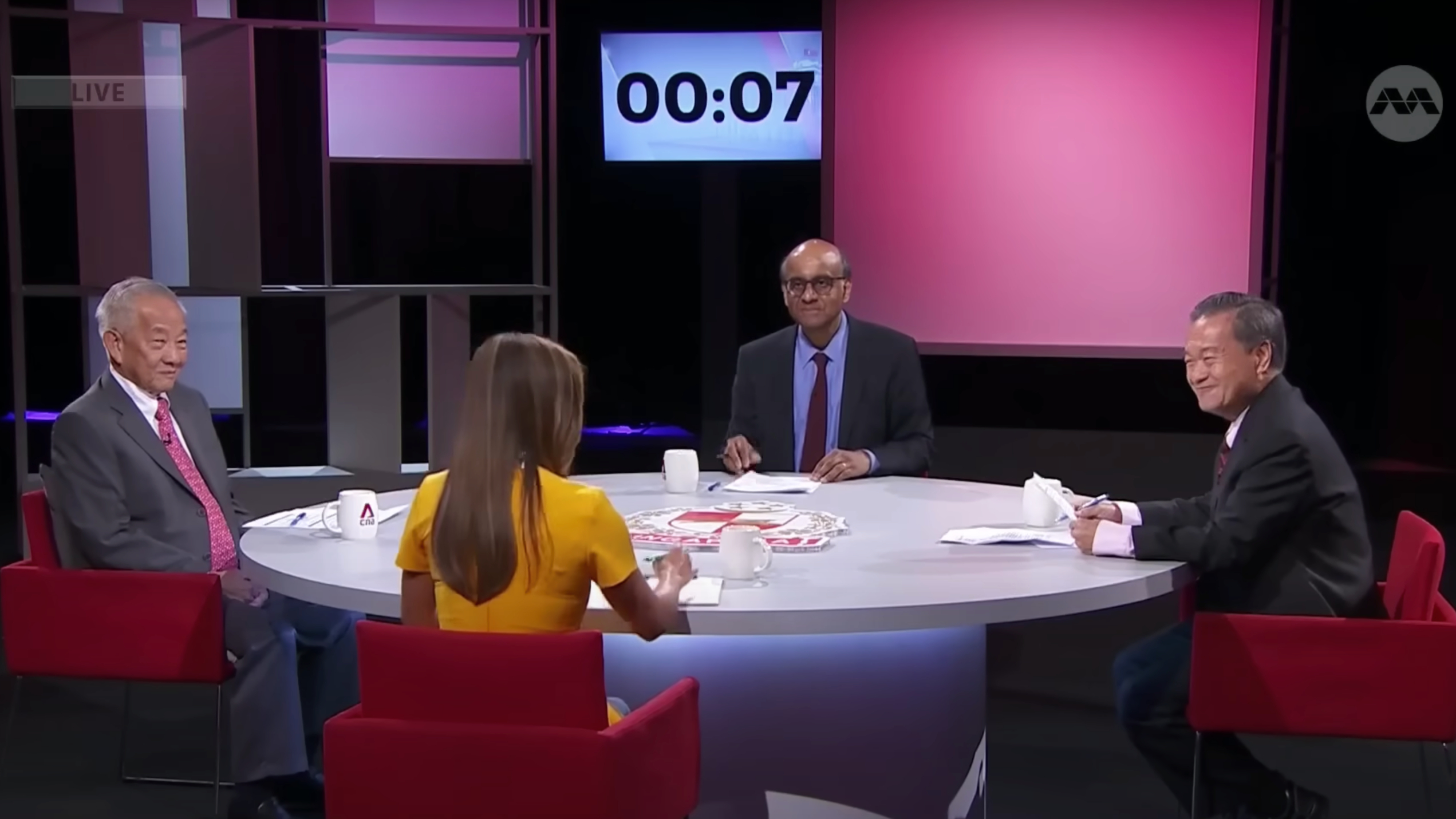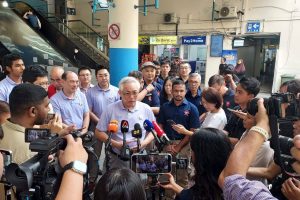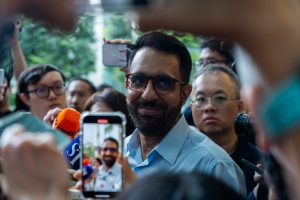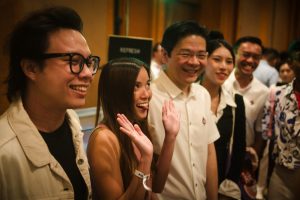Top image: CNA / YouTube
With mere days to go before Singapore votes for a new president, it feels like we’ve heard the word ‘independent’ so many times that it’s lost its meaning.
There’s a term for it: Semantic satiation. Repeating words or phrases leads to a temporary loss of meaning for the listener, causing them to perceive them as a repetition of senseless sounds.
ADVERTISEMENT
And how senseless it all feels. Each candidate—Tharman Shanmugaratnam, Ng Kok Song, and Tan Kin Lian—wants to convince voters that they’re the independent candidate. That they have free-standing agency and aren’t just a figurehead.
It’s become a sticking point for several reasons. Singapore’s constitution clearly states that our president isn’t supposed to be a member of any political party. The president is meant to be a symbol of national unity. They also happen to be the custodians of our national reserves and of the integrity of the country’s public service.
Non-partisanship is crucial. So it’s only natural that the narrative that forms around this role explores the political leanings of the three candidates—or lack thereof.
Mr Ng, the former investment chief of GIC, and Mr Tan, the former chief executive of NTUC Income, have made political independence a major focus of their presidential campaigns.
Despite his past as a prominent member of the ruling People’s Action Party for over two decades, Mr Tharman has consistently asserted his individuality by proclaiming himself as his “own man”.
Even from a perplexed voter’s perspective, it’s clear that each of them dances to their own tune when it comes to defining independence.
And amidst all the fanfare about non-partisanship, the presidential election has become an unabashedly (and unnecessarily) politicised spectacle.
Beyond Party Lines
Independence is a pretty straightforward concept: To be free of external influences or control. In science experiments, the independent variable is stable and unaffected by other measured variables.
In the upcoming presidential election, being truly independent would mean being non-partisan, plain and simple.
Right off the bat, Tan emphasised his status as an independent candidate. It’s become clear, however, that what he really means is he’s independent… of the ruling party.
Prominent opposition figures Tan Jee Say (a Singapore Democratic Party member), Lim Tean (Peoples Voice leader), and Dr Tan Cheng Bock (chairman of the Progress Singapore Party) have thrown their weight behind Tan Kin Lian.
In a full circle moment, the three Tans who ran against each other in the 2011 presidential elections appeared at a press conference together on August 27th, solidifying their alliance.
ADVERTISEMENT
Whether Dr Tan and Tan Jee Say are endorsing Tan Kin Lian in their personal capacity or not, the message is clear. This candidate has the backing of more than a few opposition figures, and he’s gunning for the anti-establishment vote.
There’s nothing wrong with being anti-establishment. Just don’t conflate it with independence.
A Different Take on Independence
On the other hand, Mr Tharman, Deputy Prime Minister and a veteran PAP member until July 7, has a more cerebral take on independence.
He’s no longer a PAP member, but his years as a popular senior minister can’t be shaken off. Try as he might, but he’s still considered the establishment-backed candidate. After all, Prime Minister Lee Hsien Loong threw his support behind Mr Tharman when he replied to the latter’s resignation letter: “Your international stature and your experience in government and politics will also stand you in good stead as you represent the nation domestically and internationally.”
Nevertheless, Mr Tharman mentioned in his first candidate broadcast on August 24th that he would maintain “independence of mind”.
“While the president stands apart from the Government and does not make policies, I will never waver from this purpose in my life and independence of mind as I fulfil my duties.”
Former PAP MP Inderjit Singh also told TODAY that Tharman has always been an independent thinker, even as a PAP veteran.
“I am confident he will exercise his independent thinking as a president, and it will serve Singapore well.”
And again, in a forum aired on CNA on August 28, Tharman urged voters to look beyond political labels, calling them “extremely simplistic”. Instead, voters should “make this a contest between individuals” and consider other characteristics such as backbone and track record.
But if we consider non-partisanship as the true definition of an independent candidate, Ng Kok Song is the clear winner. And he knows it.
Reacting to several prominent opposition figures announcing their endorsement of Tan Kin Lian, Mr Ng condemned the move as “an act of dishonour, disrespect, contempt for the office of the presidency”.
He also emphasised the importance for Singapore’s future president to be non-partisan. It’s a strategic move, of course, given that he’s the only candidate without links to any political party.
On the other hand, his 45 years in public service have led to some, including Tan Kin Lian, characterising him as someone “from the establishment”.
Mr Ng was again careful to draw the line between himself and the ruling party at the CNA forum, arguing: “There’s no better safeguard to have a non-politicised presidential election (than) to have candidates who do not have any political affiliations.”
Indeed, if we’re going by the dictionary definition of independence, Mr Ng is—on paper, at least—the one who fits the bill, with zero ties to any political parties.
Presidential Election or PAP Referendum?
Mr Tan has been arrowed by Mr Ng for bringing politics into the presidential election and turning things into a “proxy general election”. But Mr Tan isn’t the only reason for what’s shaping up to be a pre-general election face-off between the PAP and the opposition.
For one, the electorate themselves see it as a chance to express either their support or displeasure with the ruling party. Protest votes have made serious dents before—Chua Kim Yeow attracted 41.3 percent of the vote against the PAP-endorsed Ong Teng Cheong in the nation’s first presidential election in 1993.
Dr Mustafa Izzuddin, a senior international affairs analyst at Solaris Strategies Singapore, echoes a similar sentiment. He tells The Straits Times that some may engage in protest voting to show their displeasure to the government. Nevertheless, he’s of the opinion that “pragmatic voting would prevail over voting in protest”.
Because of the non-partisanship of the president’s role, the election shouldn’t be political. But it’s hard to ignore the roots of Singapore’s elected Presidency—how founding prime minister Lee Kuan Yew sought to prevent a “freak election” that could see a different ruling government spending the national reserves without (heh) reserve. Thus, the role of a president as a “block” on the reserves.
Then there’s the debacle of 2017, which saw former PAP MP and Speaker of Parliament Halimah Yacob ascending to the role as no other Malay candidates were certified eligible to run for a presidency reserved only for Malays. A “political minus”, PM Lee himself admitted. It was widely seen as a way to block opposition veteran Dr Tan Cheng Bock from contesting after his near victory in the 2011 presidential elections.
Former PAP minister George Yeo also recently revealed in a CNA interview that PM Lee had floated the idea of him running for president in 2011.
“I was among a few whom PM Lee thought could beat Tan Cheng Bock,” Yeo said.
It’s no wonder, then, that Singaporeans may baulk at the idea of casting their vote for the candidate seen as the establishment’s choice.
But they also might forget that whatever happened in the past isn’t a reflection of what it is today. In last night’s CNA forum, all three presidential candidates expressed the importance of moving the election away from politics.
Mr Tharman strongly advocates for respecting differences in views and deeper multiculturalism. Mr Ng calls for interracial empathy and compassion. Mr Tan wants to sort out the economy somehow and says he “[does] not believe in politicking”—despite the very public support he has from several opposition figures.
Beyond Independence
For how much it’s been discussed in the media and the campaign trail, it seems like Singaporeans should be looking hard into each candidate’s impartiality. But let’s be honest: independence isn’t the only criterion to consider when we vote on September 1st.
Ability, character, and relatability are other qualities voters are likely to look out for, political observers say to The Straits Times. Financial know-how was another quality that popped up when RICE took to the streets.
Just because someone is non-partisan doesn’t mean they’ll be a good president. Likewise, being a former member of a political party doesn’t automatically destroy a candidate’s credibility.
Ong Teng Cheong served as Chairman of the PAP, held various ministerial positions, and was even a Deputy Prime Minister. Yet, he’s the benchmark for a people’s president.
Rather than thinking of independence as a box to check off, we should remember, come September 1st, that it’s just one piece of the puzzle.
At the end of the day—beyond the reserves and symbol of unity bit—the president will be the face and voice of Singapore on the national and international stage. Who’s the best candidate for that, then?





